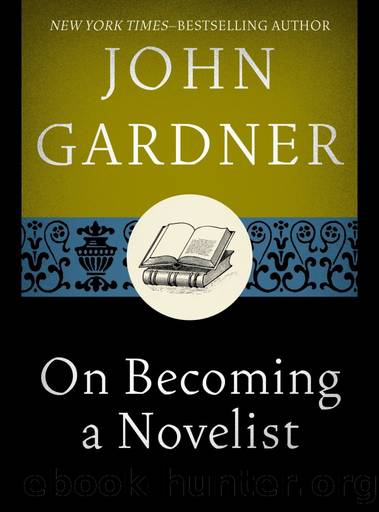John Gardner on Writing: On Becoming a Novelist, on Writers & Writing, and on Moral Fiction by John Gardner

Author:John Gardner [Gardner, John]
Language: eng
Format: azw3
Tags: Nonfiction, Writing
ISBN: 9781480466005
Publisher: Open Road Media
Published: 2013-12-10T00:00:00+00:00
It is of course possible to become a good writer without a college education or, more specifically, without courses in literature. One does not have to be college-educated to be a sensitive and intelligent human being; in fact, there are some advantages to remaining one of the so-called common people, and thus avoiding the subtle social distancing higher education imposes. Writing ability, however improvable by teaching, is in large part a gift. If one cannot get to college, one need not despair of being a writer.
On the other hand, a college education gives advantages not to be lightly dismissed. The uneducated writer may successfully tell the stories of the people around him, may set down their longings and sufferings in comic or deeply moving or awe-inspiring ways; and if he is a self-educated writer, one who reads books, goes to good movies, and listens intently to the stories he hears among his friends and fellow workers, he may even become a subtle and original storyteller. But he will almost certainly remain a sort of primitive, that is, a kind of folk writer; he has difficulty becoming a virtuoso, one of those writers whose fictions impress us not only by their truth to life but also by their brilliance, their value as performance.
Itâs hard to explain the difference between a well-educated writer, one who understands from inside the beauty of a play by Shakespeare, the strange genius of James Joyce, Andrei Bely, or Thomas Mann, and an equally intelligent writer who knows only âthe worldâ or, at best, knows only the world and the popular books he can get from his local drugstore, from a book club, or at a nearby branch of Waldenbooks. The uneducated writer is, for one thing, locked in his own time and place. Not knowing (not really knowing) about Homer or Racine or the contemporary fiction of South America, not knowing the many different ways in which a story can be told, from the rough-hemp tale-spinning of the saga poets to the dandified French allegorical tricks of the Middle Ages to the strange ways of India and China or avant-garde contemporary Africans, Poles, or Americans, he is like a carpenter with only a few crude tools: a hammer, a knife, a drill, a pair of pliers. He has no knowledge of the cunning tools of other times and places, with the result that when he asks himself what the best way of telling a given story might be, he has only two or three answers available. Or to put it another way, he has very few models for his work. He may use superbly the models he knows, becoming the literary equivalent of a maker of fine Shaker chairs; but what he might have done had he known other ways and means we will never find out.
What the writer should study if he goes to college is debatable. A good program of courses in philosophy, along with creative writing, can clarify the writerâs sense of what
Download
This site does not store any files on its server. We only index and link to content provided by other sites. Please contact the content providers to delete copyright contents if any and email us, we'll remove relevant links or contents immediately.
Technical Writing for Dummies by Sheryl Lindsell-Roberts(867)
A New Voyage Round the World by William Dampier(701)
Short Fiction by Gustave Flaubert(670)
Animation and Advertising by Unknown(623)
The Positive Trait Thesaurus: A Writer's Guide to Character Attributes by Angela Ackerman Becca Puglisi(617)
Writing Heroes and Villains (A Masterclass in Genre Fiction) by Jackson Dean Chase(584)
The Best American Magazine Writing 2020 by Sid Holt(569)
Instagram for Fiction Authors: How to Find Readers, Build Community, and Sell More Books by Sandvig Hanna R(560)
A Dictionary of Modern English Usage by H. W. Fowler;David Crystal;(546)
The Writing Revolution: A Guide to Advancing Thinking Through Writing in All Subjects and Grades by Judith C. Hochman & Natalie Wexler(530)
Write Your Own Script by A.L. Brooks(528)
News from Nowhere; or An Epoch of Rest by William Morris & William Morris(511)
How to Write a KILLER LinkedIn Profile... And 18 Mistakes to Avoid: Updated for 2019 (14th Edition) by Brenda Bernstein(503)
The Best American Travel Writing 2020 by Jason Wilson(489)
The Craft of Writing Science Fiction that Sells by Ben Bova(478)
Writer's Craft Power Pack 2: Five-Book Bundle for Authors by Rayne Hall(473)
Baudelaire and Photography by Raser Timothy;(470)
The art of fiction: a guide for writers and readers by Ayn Rand & Tore Boeckmann(460)
Instagram for Fiction Authors: How to Find Readers, Build Community, and Sell More Books by Hanna R. Sandvig(459)
